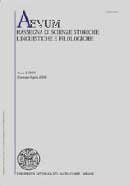Giuseppe Zecchini
Titoli dell'autore
Cesare: commentarii, historiae, vitae
digital


Anno:
2011
SUMMARY: Similarities in the structure of the commentarii written by Sulla and by Caesar provide
a starting-point to investigate how Caesar has been portrayed in Roman literature. Five
stages took place: 1) epic-historical poetry celebrating Caesar’s res gestae; 2) the commentarii
written by Caesar himself; 3) other commentarii, added to create a full corpus of Caesar’s military
deeds; 4) historical works composed by Sallust and Pollio, who think over and discuss
Caesar’s role in the crisis of the Roman republic; 5) the biography of Caesar written by Oppius,
who deals with the human aspects and personal matter of the dictator.
€ 6,00
La politica di Roma in Germania da Cesare agli Antonini
digital


Anno:
2010
Augustus continued Caesar’s expansionist policy, and Germany, instead of Britain, was his goal. A province of Germania existed between 7 B.C. and 9 A.D., and, even after Teutoburg, Augustus did not give up the plan of extending the empire borders to the Elbe. Germanicus aimed at recovering Germany, but Tiberius stopped him, lest a powerful Germanicus could threaten his own throne. Gaius Caligula probably intended to retake Germany, but his successor Claudius chose Britain. Nero had to face and stifle Boudica’s rebellion in Britain. Vespasian annexed the agri decumates (part of Baden-Württemberg), but Domitian, and Trajan, turned to Dacia and the Danube region. Therefore Tiberius’s temporary suspension of conquest of Germany became final, essentially because the army and prestige of a governor of Germania would make him a potential usurper. Reasons concerning Rome’s domestic affairs caused Arminius to be haud dubie liberator Germaniae for ever.
€ 6,00
Consulta l'archivio
Articoli Open Access
Ultimi 3 numeri
Sant’Agostino d’Ippona a Pavia da tredici secoli: reliquie, eredità culturale e spirituale, attualità. Aevum - 2025 - 1 (Supplemento)
AEVUM - 2025 - 1
AEVUM - 2024 - 3
AEVUM - 2025 - 1
AEVUM - 2024 - 3
Annate disponibili online
202520242023202220212020201920182017201620152014201320122011201020092008200720062005200420032002200120001999199819971996199519941993199219911990198919881987198619851984198319821981198019791978197719761975197419731972197119701969196819671966196519641963196219611960195919581957195619551954195319521951195019491948194719461945194419431942194119401939193819371936193519341933193219311930192919281927




















